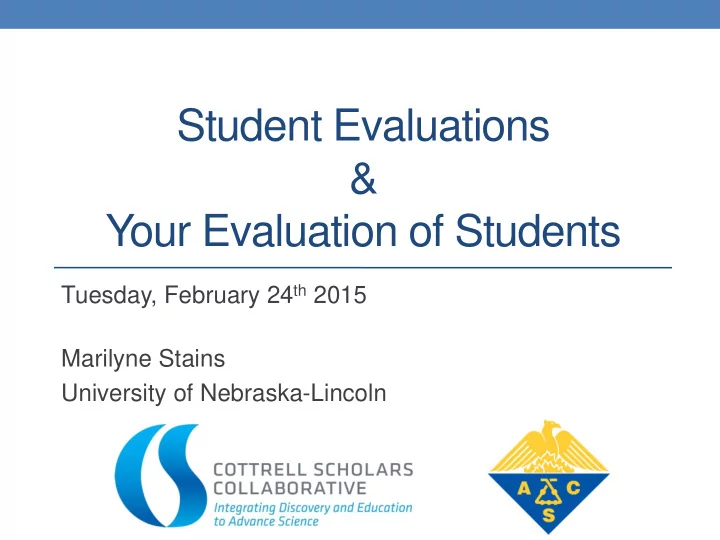

Student Evaluations & Your Evaluation of Students Tuesday, February 24 th 2015 Marilyne Stains University of Nebraska-Lincoln
Goals for Today 1. Reflection on the student evaluations you collected last semester: • Usefulness • Lessons learned about your teaching • Extent of students’ buy -in to active learning strategies • Strategies for student evaluations 2. Reflection on assessment practices: • Differentiation between formative and summative assessments • Exploration of types of formative assessment • Alignment between learning activities and assessment practices
STUDENT EVALUATIONS
Sharing of Practices • Is there a volunteer to share an evaluation tool that was particularly informative? • What was the format of the tool? • How was it implemented? • Why was it informative?
Lessons Learned about Our Teaching Strengths Weaknesses • What were the strengths • What were the that students identified in weaknesses that students your teaching? identified in your teaching? • How do you plan to address these weaknesses?
Students’ Buy -in • In your student evaluations, were complaints limited to the method , or did they also relate to other things such as the length of your assignments and exams, the clarity of your lecturing, or your lack of availability and/or respect for students? From http://www4.ncsu.edu/unity/lockers/users/f/felder/public/Columns/HangInThere.pdf
Students’ Buy -in • Did you explain to the students why you were using the method? (link: http://cwsei.ubc.ca/resources/video/ClickerExplainFlash.html)
Students’ Buy -in • Did you use the new method long enough to overcome the learning curve associated with it? • If you got unsatisfactory student ratings, did you check references on the method to see if you were implementing it adequately ? • In your midterm evaluations, did you specifically ask the students whether they thought active learning (or whatever you were doing) was (a) helping their learning , (b) hindering their learning, or (c) neither helping nor hindering? • Useful resource: • http://www4.ncsu.edu/unity/lockers/users/f/felder/public/Papers/Resist.html From http://www4.ncsu.edu/unity/lockers/users/f/felder/public/Columns/HangInThere.pdf
Strategies for Student Evaluations • Data collected from students • Summative: Student Evaluation of Educational Quality • Formative: • Group Instructional Feedback Technique: page 1 of http://ofd.ncsu.edu/docs/mcconnell-handout1-sept-24.pdf • Peer observation • Your Teaching and Learning Center can help • A DBER faculty on your campus could be useful • Have a meeting before and after the observation • Use an observation protocol such as a short version of COPUS
STUDENTS’ ASSESSMENT
The Role of Assessment • When do your students get feedback on their level of understanding of the topic? • What do you do with the results of the assessment you collect?
When to Assess? FORMATIVE • Assesses what students currently know • Helps teacher and students identify individualized learning goals • Engages students in the learning Entry Level • Measures understanding BEFORE course or unit • Assesses progress toward learning goals • Informs teacher and students of need for re-teaching/re-learning Progress • Measures understanding at points WITHIN course or unit Monitoring SUMMATIVE • Assesses whether learning outcomes have been achieved • Measures understanding at END of course or unit Summative
Formative Assessment Resources • Formative Assessment strategies: • http://pages.uoregon.edu/tep/resources/newteach/fifty_cats.pdf • Examples: • Background Knowledge Probe or concept inventories • Minute Papers • Just-in-Time Teaching • Peer Instruction – conceptual clicker questions • Listening to student discussion in class • In-class work / Tutorials • Ranking / ordering tasks • Think-pair-share
What to Assess? • Alignment between learning goals, assessment, and classroom activities is essential! Learning Formative Assessment: Formative Assessment: Summative Activities Goal Entry Level Progress Monitoring Assessment
Next Meeting • Wednesday, March 18, at 3:30 pm EST • Topic: Share your favorite classroom activity! • Are there other topics you like discussed in future events?
Recommend
More recommend